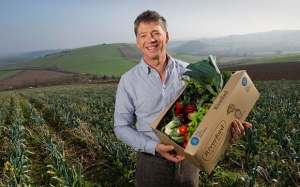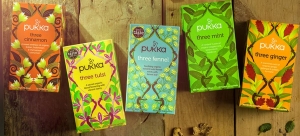![]() By Caroline Hagen
By Caroline Hagen
Can doing the right thing lead to commercial rewards? Let’s take a closer look…
In the worlds of branding and packaging, ethics have long been a consideration. From the launch of Oxfam’s Fair Trade Organisation back in 1964, through to today’s plethora of new and inventive packaging formats with reduced environmental impact, being green and ethically clean is big news.

source: Oxfam
So should you care about your brand’s ethical credentials? And what matters most: sustainability, Fair Trade, locally sourced, or something else?
It all matters – so where should you focus?
Broadly speaking, there are five factors to consider when it comes to creating, branding and packaging an ethical product.
- Sustainability – what impact does the product, its production and its packaging have on the environment?
- Sourcing – how far does it travel, and how? What impact do your sourcing decisions make on the wider community?
- Production – what are the hidden costs? Or have you developed a new and better way?
- People – who makes it? Are they treated with decency and respect? What about the wider community?
- Welfare – in the world of food and drink, human welfare isn’t the only consideration. If you use animal ingredients, have those animals lived and died well?
It’s rare that a brand can be a hero in every category – if you are, well done! However, it’s more typical for brands to focus on one or two areas. This means you can can really deliver on your promises. If you’re ambitious, you might perhaps include a third area to work towards as your mission.
Only you can decide the right focus for your business and brand, but let’s consider the different factors that come into play when consumers are considering ethical brands – and the reasons why your FD may thank you for making the ‘right’ choice.
CSR – and sleeping well at night
Of course, doing the right thing has its own rewards in terms of simple feel-good factor. But it goes deeper than that. By choosing ethical options wherever possible, there are tangible business benefits in the shape of improved employee morale, a great PR story, and success when it comes to Corporate Social Responsibility (CSR) targets.
Perception – quality and reassurance
Mintel has tracked the reasons consumers buy ethical products, and the results are surprising. 45% of sustainable food and drink consumers say superior quality is the reason they buy. 42% say they’re concerned with food safety, while 43% choose sustainable food and drink because they’re concerned about environmental impact and human welfare. Interesting stuff, when it comes to deciding where to focus…
Price point – you can charge more
Mintel also tells us that 37% of consumers think ethical standards are compromised in low-priced food. So even if doing right adds a fraction to your costs, it may be worth it as consumers will be happy to pay more for your products.
However, this is a double-edged sword. The same report suggests that only one in four trust that the extra paid for Fair Trade goes to producers, and over over half of organic buyers agree it’s too expensive to buy regularly – both factors worth considering when it comes to positioning, branding and marketing ethical products.
Loyalty – a deeper connection?
Anecdotally speaking, it seems that ethical brands build deeper relationships with their customers, too. Take the veg box business, Riverford. First to market back in 1986, it has been much-imitated, yet remains co-market leader with around 50,000 customers. Many remain loyal because of the company’s fiercely ethical stance.
Owner Guy Watson shares strong opinions on a variety of topics through in-box newsletters – standing up against TTIP and supporting workers rights, right through to backing bees and why we should all eat more seasonally. Though not all consumers agree with him, this is what being a brand is all about – you may not appeal to everyone but you really appeal to your target audience.

source: The Telegraph
Diversification – trust you can build on
Let’s stick with the Riverford example for a second point – diversification. From beginnings in boxes of veg, the brand expanded its offering to include meat, dairy, drinks, and more recently, ethical store-cupboard staples. Customers are more likely to buy and try with brands they’ve already got a relationship with, so opportunities for diversification and future growth build the business case for a loyalty-inspiring ethical standpoint.
Differentiation – the stand-out factor
Last but far from least comes differentiation. There are few products that are completely new, so an ethical stance can provide a valuable point of difference. Whether you choose Fair Trade or locally sourced ingredients; are mindful about your packaging; or you always treat people, animals and communities with respect, tell your customers all about it. It could be the difference between your product and the one that’s a couple of pence cheaper.
Pukka Herbs do a great job of standing out in a crowded marketplace, both through stunning pack design and ethical choices. Ingredients are sourced directly from growers in impoverished areas, packaging is certified sustainable through the FSC board, they use vegetable inks, and environmental impact is considered all the way through to unbleached tea bags and strings.

source: Pukka Herbs
The two-minute-takeaway
It seems clear there is a clear business case for taking an ethical standpoint. Whether you’re doing it for CRS, perception, to secure a higher price point, for loyalty, or to stand out on shelf, the feel-good factor shouldn’t be your only reward. In fact, the Mintel Global New Products Database (GNPD), there are now 13,000 more new sustainable food and drink products since 2005 – and 13,000 brands can’t be wrong!
Looking for ethical inspiration? Reach’s Rachelle Corker has been exploring new packaging ideas to meet sustainability issues.